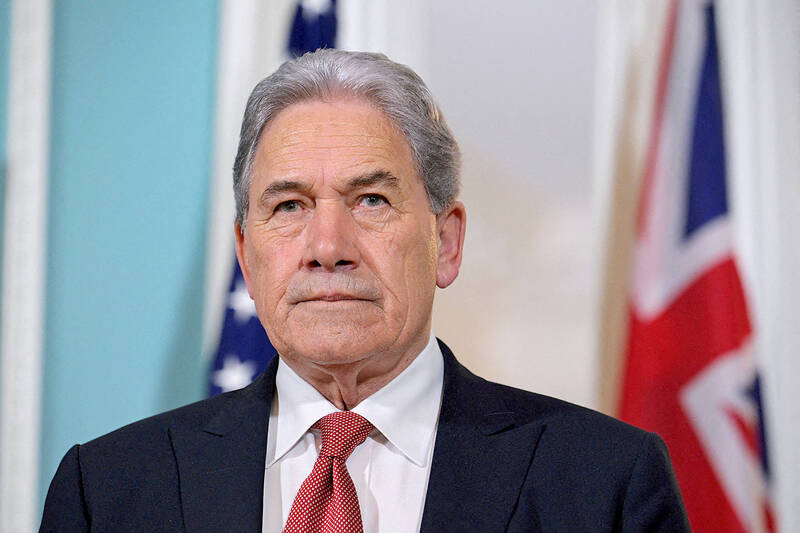New Zealand Minister of Foreign Affairs Winston Peters is to touch down in Beijing today for a three-day visit after relations between the two nations have been strained by Chinese navy vessels conducted live-fire exercises in the Tasman Sea.
New Zealand and Australian officials said that China had conducted live-fire exercises in international waters between the two nations, giving little notice and forcing commercial airlines to divert flights.
The three ships yesterday were about 280 nautical miles (519 km) east of Tasmania, outside of Australia’s exclusive economic zone, the New Zealand Defence Force said.

Photo: Reuters
New Zealand Prime Minister Christopher Luxon yesterday said that the limited notice that China had given that it would undertake live-fire exercises would be raised in Beijing.
“There is nothing illegal here in terms of they are compliant with international law,” Luxon said.
“The issue for us is ... we’d appreciate a little bit more advance notice particularly on what is a busy air route,” he said.
The Chinese Ministry of Foreign Affairs did not immediately respond to a request for comment.
Peters’ visit to China is part of a trip that includes stops in the United Arab Emirates and Saudi Arabia, Mongolia and South Korea. In Beijing, he is to hold talks with senior Chinese leaders, including Chinese Minister of Foreign Affairs Wang Yi (王毅).
Peters last week in a statement said that he would discuss with Chinese officials the bilateral relationship, as well as Pacific, regional and global issues that are of interest to both nations.
“China is one of New Zealand’s most significant and complex relationships, encompassing important trade, people-to-people and cultural connections. We intend to maintain regular high-level political dialogue with China,” Peters said.
Peters has also voiced concerns that the Cook Islands, an independent nation in free association with New Zealand, had signed a comprehensive strategic partnership and other agreements with China without satisfactorily consulting with New Zealand.
Jason Young, director of the New Zealand Contemporary China Research Centre at Victoria University in Wellington, said while questions around challenging issues such as the Cook Islands deal and the Chinese navy’s activities in the Tasman Sea would be asked, there would also be discussion around further high-level visits and trade.

‘TERRORIST ATTACK’: The convoy of Brigadier General Hamdi Shukri resulted in the ‘martyrdom of five of our armed forces,’ the Presidential Leadership Council said A blast targeting the convoy of a Saudi Arabian-backed armed group killed five in Yemen’s southern city of Aden and injured the commander of the government-allied unit, officials said on Wednesday. “The treacherous terrorist attack targeting the convoy of Brigadier General Hamdi Shukri, commander of the Second Giants Brigade, resulted in the martyrdom of five of our armed forces heroes and the injury of three others,” Yemen’s Saudi Arabia-backed Presidential Leadership Council said in a statement published by Yemeni news agency Saba. A security source told reporters that a car bomb on the side of the road in the Ja’awla area in

PRECARIOUS RELATIONS: Commentators in Saudi Arabia accuse the UAE of growing too bold, backing forces at odds with Saudi interests in various conflicts A Saudi Arabian media campaign targeting the United Arab Emirates (UAE) has deepened the Gulf’s worst row in years, stoking fears of a damaging fall-out in the financial heart of the Middle East. Fiery accusations of rights abuses and betrayal have circulated for weeks in state-run and social media after a brief conflict in Yemen, where Saudi airstrikes quelled an offensive by UAE-backed separatists. The United Arab Emirates is “investing in chaos and supporting secessionists” from Libya to Yemen and the Horn of Africa, Saudi Arabia’s al-Ekhbariya TV charged in a report this week. Such invective has been unheard of

‘SHOCK TACTIC’: The dismissal of Yang mirrors past cases such as Jang Song-thaek, Kim’s uncle, who was executed after being accused of plotting to overthrow his nephew North Korean leader Kim Jong-un has fired his vice premier, compared him to a goat and railed against “incompetent” officials, state media reported yesterday, in a rare and very public broadside against apparatchiks at the opening of a critical factory. Vice Premier Yang Sung-ho was sacked “on the spot,” the state-run Korean Central News Agency said, in a speech in which Kim attacked “irresponsible, rude and incompetent leading officials.” “Please, comrade vice premier, resign by yourself when you can do it on your own before it is too late,” Kim reportedly said. “He is ineligible for an important duty. Put simply, it was

US President Donald Trump on Saturday warned Canada that if it concludes a trade deal with China, he would impose a 100 percent tariff on all goods coming over the border. Relations between the US and its northern neighbor have been rocky since Trump returned to the White House a year ago, with spats over trade and Canadian Prime Minister Mark Carney decrying a “rupture” in the US-led global order. During a visit to Beijing earlier this month, Carney hailed a “new strategic partnership” with China that resulted in a “preliminary, but landmark trade agreement” to reduce tariffs — but